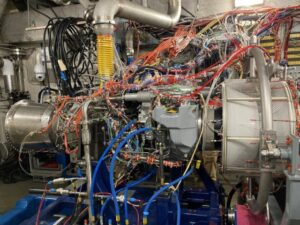The delay in delivering the Army’s new helicopter engine has pushed back the schedule for the Future Attack Reconnaissance Aircraft (FARA) by around eight months, according to the service’s top acquisition official, with a Milestone B decision now planned for the first quarter of fiscal year 2026.
Doug Bush, assistant secretary of the Army for acquisition, logistics and technology, told lawmakers on Wednesday the delay with the General Electric Aviation
[GE]-built T901 engines is due to quality control with parts and said the adjusted schedule for FARA is “a bit of a concern.”

“The delays are certainly disappointing. The nature of the delays, as I understand them, really relate to quality control at sub-vendors within General Electric’s vast vendor base, where they’ve had trouble making some new components, including with some new methods like 3D printing, to the level of quality required for engines we can actually put in test aircraft,” Bush said during a House Armed Services Tactical Air and Land Forces Subcommittee hearing. “I’ve had many engagements with GE on that. They believe they have it under control. My team of experts believes their current estimates are reasonable. But it is a delay.”
GE Aviation was awarded a $517 million contract in February 2019 to develop its T901 engine for the Improved Turbine Engine Program, which will eventually power the Army’s AH-64 Apache and UH-60 Black Hawk helicopters as well as the future FARA platform (Defense Daily, Feb. 1, 2019).
During a Senate Armed Services Airland Subcommittee hearing on Tuesday, Bush noted the Army ignited the second T901 test engine last week.
“So we are on a path to a better situation…GE leadership is fully aware of it. I’ve had many conversations with them myself. They know we are watching closely. They know how vital the program is. They’re committed to getting it right,” Bush said during the SASC Airland hearing. “Right now, I’m cautiously optimistic that our updated timelines will hold but this will require constant attention”
The Army has selected Bell’s [TXT] 360 Invictus and Sikorsky’s [LMT] Raider X designs for the FARA competitive prototyping phase as it looks to field a new scout attack helicopter.
Bush confirmed to reporters in March the Army now expects delivery of the T901 engines to Bell and Sikorsky in early 2024, which has pushed back the first flight of the FARA prototypes to next year (Defense Daily, March 15).
Army officials had targeted last November for delivery of engines to the FARA competitors, which included plans to potentially have first flight in late 2023.
Rep. Rob Wittman (R-Va.), chair of the HASC Tactical Air and Land Forces Subcommittee, pressed Bush on the status of the Army’s ongoing Analysis of Alternatives (AoA) study for FARA, which assesses procurement pathway options, asking why the process is occurring now rather than several years ago.
“It’s alarming to me that those haven’t been done to this point. To me, that should have been done earlier in the process. And we’re seeing that being delayed now,” Wittman said. “If at this particular point with as much investment that’s been made, which is now about $2 billion, what if an AoA shows that there’s a better alternative. It seems like we’ve spent an awful lot of money if we end up in a different place. And if that’s the case, I don’t want to repeat the same challenges the Army went through with [canceled] Comanche [helicopter program].”
Bush said the Army initiated the AoA process once it settled on a traditional acquisition approach for FARA, which requires the study to be completed before making a Milestone B decision.
“To be fair to my predecessors, I believe there was hope at the time to be able to go perhaps earlier to a Milestone C-type approach or even perhaps rapid fielding. But based on where the program is and the technology, we decided the more responsible approach would be to go to a traditional Milestone B, which requires the AoA,” Bush said. “Ultimately, the decision on moving forward on the Milestone B will belong to [DoD Acquisition Executive Bill] LaPlante, advised by the Army, CAPE and others. I think I’m confident though that the AoA, the way it’s structured, is fair. It is very thorough. It is examining many alternatives. I think that’s good.”